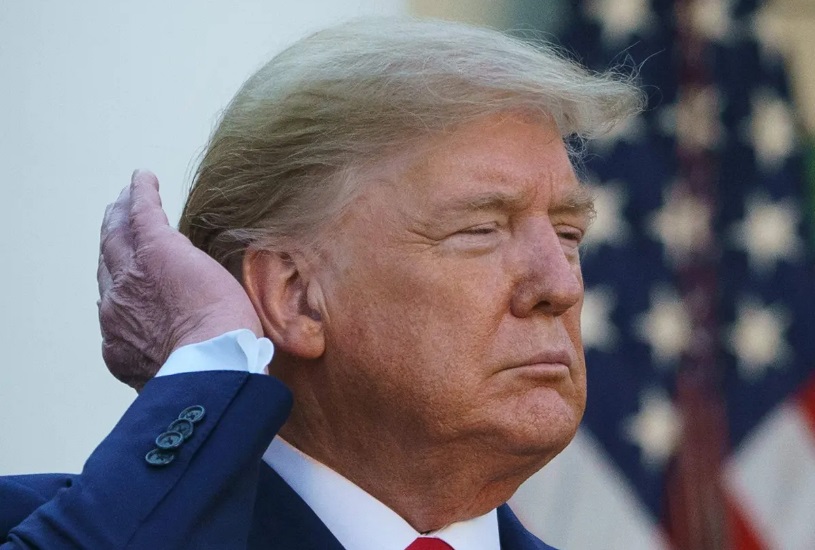On the eve of the Republican National Convention where President Trump hopes to revive his flagging political fortunes, he has announced the emergency authorization of convalescent plasma for COVID-19.
Many scientists and physicians believe that convalescent plasma might provide some benefit but is far from a breakthrough.
It is rich in antibodies that could be helpful in fighting the coronavirus, but the evidence so far has not been conclusive about whether it works, when to administer it and what dose is needed.
On CBS’s “Face the Nation” today, former FDA commissioner Scott Gottlieb said the blood product — derived from patients who have survived covid-19 — is “probably beneficial” for covid-19 patients.
The issuance of an emergency authorization would make it easier to get in some settings.
But he also said it already is widely available, so the change would be “incremental.”
The announcement comes as Trump has put extraordinary pressure on federal agencies to test and approve treatments and, especially, a vaccine against the novel coronavirus, which has already killed more than 170,000 Americans.
Trump’s political advisers believe that having a vaccine by Election Day is key to his prospects for winning.
It also lands a day after the president without evidence accused the FDA of impeding enrollment in clinical trials for coronavirus vaccines and therapeutics for political reasons.
“The deep state, or whoever, over at the FDA is making it very difficult for drug companies to get people in order to test the vaccines and therapeutics,” Trump said on Twitter on Saturday. “Obviously, they are hoping to delay the answer until after November 3rd. Must focus on speed, and saving lives!” He tagged Hahn in the tweet.
Today, White House chief of staff Mark Meadows defended Trump’s tweet.
“I can tell you that the announcement that’s coming today should have been made several weeks ago,” Meadows said on “Fox News Sunday,” previewing the administration’s plans. “It was a fumble by a number of people in the federal government that should have done it differently . . . and having been personally involved with it. Sometimes you have to make them feel the heat if they don’t see the light.”
Convalescent plasma has long has been used for other infectious diseases, including Ebola.
The treatment’s effectiveness for covid-19 has appeared promising but has remained unsettled because scientists don’t yet have results from rigorous clinical trials.
The tens of thousands of patients already treated have been enrolled in an expanded access program sponsored by the FDA and run by the Mayo Clinic.
Carlos del Rio, executive associate dean of the Emory School of Medicine, said that it was an exaggeration to call plasma a “breakthrough.”
He called plasma an “interesting strategy” and said the data so far was a “nice hint” that it could be helpful, but stressed that it was “not going to win the game.”
“The problem is, the President, in my mind, has lost total credibility because of what he’s done with hydroxychloroquine. He’s touted so many things that don’t work,” del Rio said. “The reality is what we have today to treat covid is extremely limited.”
Kate Fry, chief executive of America’s Blood Centers, which represents blood banks, said the Mayo program was never designed to provide plasma supply long term.
“It really has gotten so large that it has sort of gone past its intended purpose,” she said, adding that the FDA approval would ease the burden for clinicians and physicians.
One of the administration officials who spoke on the condition of anonymity said that the announcement followed two weeks of “insane fights.”
Whether the FDA should give plasma emergency authorization — a temporary approval granted during a public health emergency that requires much less rigorous evidence than a full approval — follows weeks of discussion.
Some scientists at the National Institutes of Health have argued that the efficacy data wasn’t strong enough — but NIH does not control FDA decisions, the FDA pointed out last week.
Gottlieb, during his television interview Sunday, defended the FDA, saying he “fundamentally rejected” the idea that officials would slow down or accelerate a decision based on political pressure.
Until recently, Trump had praised the FDA for moving quickly on coronavirus treatments and vaccines.
But on Wednesday, he claimed the FDA was delaying authorizing convalescent plasma until after Nov. 3 for political reasons.
The administration’s briefing Sunday comes as Trump’s job approval ratings are battered by his handling of the pandemic.
A Washington Post-ABC News poll released Aug. 17 found that Trump faces a double-digit deficit nationally against Democratic presidential nominee Joe Biden, and that 59 percent of Americans disapprove of Trump’s management of the crisis, while 40 percent approve.
The coronavirus has also repeatedly upended Trump’s desire for a lavish political coronation, as a dispute with North Carolina’s Democratic governor over virus protocols prompted Republicans to shift their convention festivities to Jacksonville, Fla., only to have those plans called off because of the worsening pandemic conditions there.
Though some convention activities will still take place in Charlotte — the initial site of the RNC — the president will deliver his formal acceptance speech from the Rose Garden on Thursday night.
Trump is scheduled to travel to North Carolina on Monday.
One speaker after another at last week’s Democratic National Convention, topped by Biden himself, hammered Trump and his administration for its management of the pandemic and stressed that the former vice president was prepared to handle the health and economic crisis.
